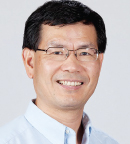
Ben Shen, PhD

Christoph Rader, PhD
A pair of scientists from the Florida campus of The Scripps Research Institute (TSRI) have been awarded up to $3.3 million from the National Cancer Institute of the National Institutes of Health (NIH) to create the next generation of breast cancer treatments for the thousands of patients whose current treatment options are limited. Ben Shen, PhD, Professor at The Scripps Research Institute and Co-Chair of the Department of Chemistry, and Christoph Rader, PhD, TSRI Associate Professor in the Department of Immunology and Microbiology at The Scripps Research Institute, will co-lead the new 5-year study.
The researchers aim to develop an antibody-drug conjugate. This new class of anticancer drugs combines the specificity of antibodies, which attack only cells they recognize, with a highly toxic payload designed to kill specific cancer cells with far greater efficiency than most currently available treatments. So far, only three of these combination therapies have been approved by the U.S. Food and Drug Administration (FDA).
The new antibody-drug conjugate approach targets HER2-postive and ROR1-positive breast cancers, which are often aggressive and more difficult to treat with conventional chemotherapy and hormone drugs.
Earlier Research
The new grant builds on the work done in both the Shen and Rader labs.
Dr. Shen and his colleagues recently uncovered a new class of natural products called tiancimycins, which kill selected cancer cells more rapidly and more completely than the toxic molecules already used in FDA-approved antibody-drug conjugates.
Dr. Rader has been studying and developing site-specific antibody-drug conjugates to treat cancer. “This grant matches my lab’s work on advancing antibody engineering and conjugation technologies with the world-class natural product-based drug discovery in Ben Shen’s lab,” Dr. Rader said. “It’s precisely what I came to Scripps Florida for: to build new molecules at the interface of chemistry and biology that can advance medicine.” ■

